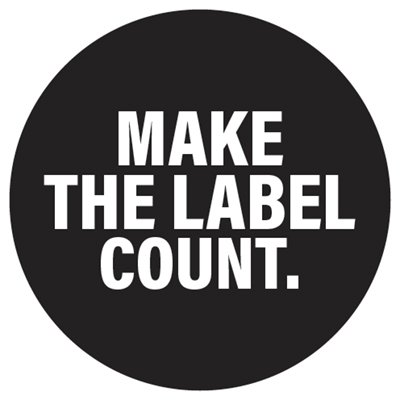
Make The Label Count
@MakeLabelCount
Followers
612
Following
40
Media
81
Statuses
212
We are an international coalition of organisations who share an ambition to ensure the EU’s clothing sustainability claims are credible.
Joined August 2021
Is recycled polyester simply ‘plastic waste in disguise’? A great read on fashion’s plastic addiction https://t.co/rgJOlDZnQ5
0
2
4
Is your clothing shedding microplastics? Ignoring it in environmental ratings disregards its impact. We urge the EU to adopt an inclusive methodology. Learn more: https://t.co/oxOyx2F1oW
1
1
3
Microplastics are everywhere - in air, water, dust, and food. Even synthetic clothes shed them. Apparel ratings must address microplastic release. Reducing plastic use is crucial, as this article also says:
theguardian.com
No corner of the planet is free from minuscule fragments of plastic packaging, textiles or utensils. We ask scientists what this means for our health – and what we should do to protect it
0
2
1
EPR empowers producers to responsibly handle products post-use. MTLC Coalition member @Fibershed highlights the value of Targeted EPR programs - adaptable fees tied to textile waste data offer a solution to systemic challenges. https://t.co/jkFKEEwFKI
0
1
2
Measuring durability of apparel and footwear requires accounting for factors like style, fit, and trend-driven consumption – not simply physical durability. Let’s integrate holistic research to accurately measure product sustainability and drive industry change.
0
0
1
Greenwash Danger Zone by @Greenpeace finds just 3% of clothing is made from recycled materials, mostly from plastic bottles. Despite claims of circularity, the reality is different. A circularity indicator is critical and must be included. Read more: https://t.co/HlFs9BiOMW
0
1
2
A new report by @ChangingMarkets estimates that >300M items of unsellable synthetic clothing land in Kenya each year, contributing to plastic waste dumped, landfill, or burned. The EU's PEF methodology must account for solid plastic waste. Read the report: https://t.co/nn4MrmbUY9
0
2
5
Inhaling microplastics can have harmful health impacts, as highlighted in a report by @ciel_tweets. Too much is known about the scale of microplastic pollution to prevent this information from influencing consumer purchasing choices. Learn more: https://t.co/hOxiaR930X
0
0
1
The EU's Green Claims Directive public consultation is now open! MTLC is pleased the limitations of the PEF methodology have been recognised. It must include microplastic, plastic waste and circularity indicators. Share your feedback before 17 July here: https://t.co/5vjekXxwMY
0
0
0
We are pleased the @EU_Commission recognises PEF limitations in Green Claims Directive, supporting its enhancement. We urge the EC to ensure any future framework only delivers meaningful information to EU consumers, preventing greenwashing & promoting responsible behaviour.
1
0
1
"The era of vague claims and shaky data is over. It's time to clean house." Our campaign spokesperson @DalenaWhite responds to the EU's Green Claims Directive, warning using the PEF in its current form could risk licensing #greenwashing." #sustainability. https://t.co/pc0ZuzQ5t9
apparelinsider.com
In an Op-Ed for Apparel Insider, Dalena White, a spokesperson for Make the Label Count (MTLC) responds to the recent announcement of the EU’s Green Claims Directive. LONDON – We all know the fashion...
0
0
0
According to @McKinsey some garments are thrown out after just 7 or 8 wears. These cheap, synthetic clothes are treated as disposable by consumers, fuelling the growth of fast fashion. Let's take the @EU_Commission lead and make #FastFashion out of fashion.
0
0
0
"Be clear about where the green claim you're making starts and ends." That's the advice from #MakeTheLabelCount member @GHardingRolls for brands to avoid greenwashing.
0
2
4
Almost 70% of clothing is made from plastic. Fast fashion's high-speed model produces clothes from fossil fuel-derived materials that shed microplastics. It's time to properly assess plastic pollution in brands' environmental claims and tackle the growth of fast fashion.
0
1
5
As environmental claims by fashion brands face increased scrutiny, #MaketheLabelCount member @GHardingRolls shares advice on navigating product labelling and avoiding greenwashing.
0
1
3
Microplastic proliferation is widespread, & synthetic clothing is one of the biggest contributors to microplastic pollution. Consumers deserve clear information on microplastic impact of clothing. Any sustainability claims made by fashion brands must address microplastic release.
0
5
10
Fashion is drowning in greenwashing due to self-governed ‘sustainability’ definitions by brands. As a result, regulation & harmonised sustainability language for consumers are crucial. @GHardingRolls from #MaketheLabelCount explains why sustainability claims need regulation.
0
4
5
2022 saw heightened scrutiny of environmental claims made by fashion brands. The Higg Material Sustainability Index controversy exposed flaws in current LCA-based methods for measuring textile product impact. With greenwashing in focus, accuracy in claims is crucial.
0
0
7
We welcome the @EU_Commission proposal to substantiate environmental claims & are pleased to see PEF’s shortcomings recognised. We will review the recommended criteria & work with lawmakers to ensure the law is aligned with the EU’s goals. #MakeTheLabelCount
0
0
2
The @EU_Commission treads a fine line between making a real difference and creating extra problems as it prepares to announce key proposals for legislation to tackle greenwashing. https://t.co/M0fOhuGG4R
ww.fashionnetwork.com
As the European Commission prepares to announce key proposals for legislation to tackle greenwashing this week, a key advocacy group has a clear wishlist of what its wants to see.
0
0
0



